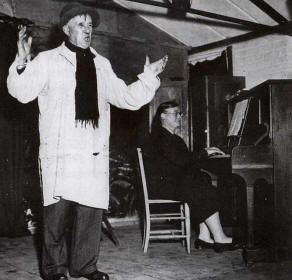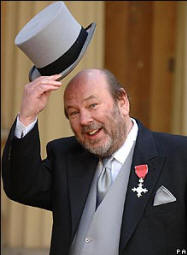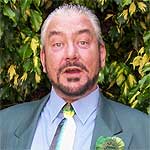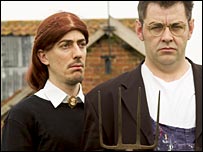| The Great Tradition Just like the Norfolk
coastline, the Norfolk dialect is under constant attack.
However, it's not from the destructive effect of the
North Sea but from the spread of 'estuary English'.

The late, great Sidney Grapes: 'Do you mark my words, together?'
Norfolk's relatively isolated location has meant that
Norfolk dialect has survived when many other local
speech patterns have been subsumed. Yet, since the
publication of The Vocabulary of East Anglia by
the Rev. Robert Forby in 1830 many Norfolk words have
undoubtedly been lost. Fortunately though, Norfolk
dialect, or more accurately the Norfolk accent, is still
alive and well thanks in large part to champions such
as Keith Skipper who helped to found F.O.N.D. (Friends
of Norfolk Dialect).

Keith Skipper receiving MBE
The Norfolk accent has also helped to preserve and
nurture the county's unique sense of
humour. In fact, the Norfolk accent lends itself perfectly
to humour and particularly to that shrewd, under-stated
type of rural wit. There is a long
tradition of Norfolk 'stand-up' comedians and singers.
Sidney Grapes - alias 'The Boy John' - was one of its
outstanding, if unlikely, stars. A garage owner in
Potter Heigham
by day - but a popular local entertainer and writer of
The Boy John Letters by night - his work
remains quintessentially 'Norfolk'.
Following in his footsteps have
come: 'The Kipper Family' (represented today by 'Sid Kipper') and 'The Nimmo Twins'. However, in the
ranks of Norfolk dialect performers, Allan Smethurst,
The Singing Postman was probably the most famous. For a
short period of time in the 1960s his nostalgic and
humorously romantic songs - all written in Norfolk
dialect - were enjoyed through out the UK. In particular
his song
Hev Yew Gotta Loight, Boy? captured the popular
imagination.

The Boy Kipper
One of the main problems with being a Norfolk dialect
performer is that you are naturally restricting your
audience. (It is a well known fact that Sid Kipper
doesn't go down well at the Glasgow Empire.) However, in
some ways, this only adds to its appeal.

The Boys Nimmo
Here are a few famous Norfolk dialect words:
|

